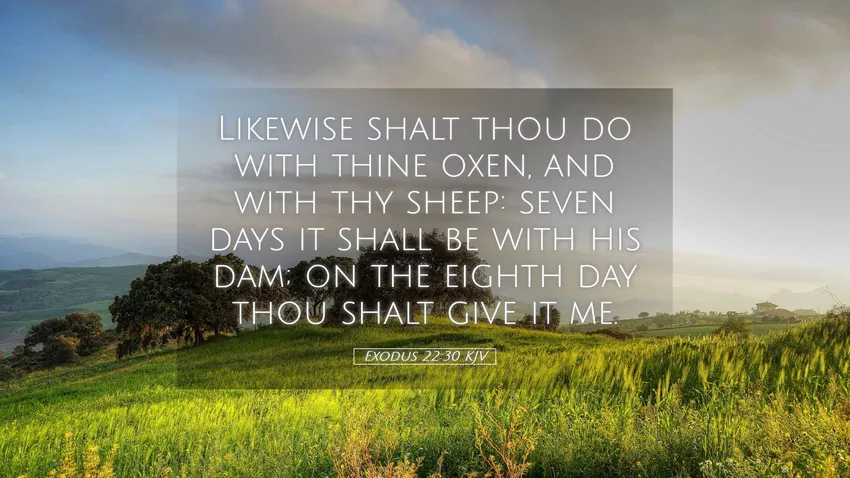Read the Daily Bible Verse – Exodus 22:30 To Strengthen Your Spiritual Journey.
Exodus 22:30 is a verse in the Bible that carries significant theological and moral implications. Found in the Old Testament, it reads:
“Likewise shalt thou do with thine oxen, and with thy sheep: seven days it shall be with his dam; on the eighth day thou shalt give it me.” (KJV)
This verse is a command given by God to the Israelites, instructing them on how to dedicate their firstborn livestock to Him. To fully understand this verse, we must explore its historical, theological, and practical contexts.
The Context on Exodus 22:30 KJV
Historical Background
Exodus 22 is part of the Covenant Code, a collection of laws given by God to the Israelites shortly after their liberation from Egypt. These laws encompass various areas of life, including worship, justice, and morality. Verse 30 is nestled within a section that discusses offerings and consecrations to God, highlighting the sanctity of dedicating the firstborn.
The Significance of Firstborn Offerings
In ancient Israel, the firstborn of both humans and animals held special significance. This practice was rooted in the events of the Exodus when God spared the firstborn of Israel during the tenth plague in Egypt (Exodus 12). As an act of gratitude and acknowledgment of God’s deliverance, the Israelites were commanded to consecrate their firstborn to Him (Exodus 13:2).
The Exodus 22:30 Meaning
Dedication to God
Exodus 22:30 emphasizes the principle of dedicating the first and the best to God. By requiring that the firstborn livestock be given to God, it reflects the broader biblical theme of offering the “firstfruits” as an act of worship and recognition of God’s provision.
Symbolism of the Eighth Day
The reference to the eighth day is significant. In biblical numerology, the number seven represents completeness, as seen in the seven days of creation. The eighth day symbolizes a new beginning or sanctification. Waiting seven days before offering the firstborn animal allowed it to mature slightly, making the offering more valuable.
Holiness and Gratitude
The verse also underscores the importance of holiness and gratitude. By setting apart the firstborn, the Israelites demonstrated their trust in God’s provision and their commitment to living in a covenant relationship with Him.
Exodus 22:30 Application in Life
Prioritizing God in Our Lives
The principle of giving our “firstfruits” to God is timeless. For Christians today, this can translate into prioritizing God in various aspects of life, such as dedicating the first moments of our day to prayer or giving the first portion of our income to the church or charitable causes.
Trusting in God’s Provision
By dedicating their firstborn livestock to God, the Israelites expressed their trust that God would continue to provide for their needs. Similarly, Christians are called to trust in God’s provision, even when sacrifices feel costly.
Holiness in Daily Living
Exodus 22:30 challenges believers to live lives of holiness, setting apart what is sacred and honoring God in all they do.
Comparison with Other Biblical Texts
Leviticus 22:27
Leviticus 22:27 also addresses the offering of animals:
“When a bullock, or a sheep, or a goat, is brought forth, then it shall be seven days under the dam; and from the eighth day and thenceforth it shall be accepted for an offering made by fire unto the Lord.”
This verse reinforces the pattern of waiting seven days before offering an animal, emphasizing proper preparation and respect for God’s commands.
Numbers 18:17
Numbers 18:17 provides additional details about the firstborn offerings:
“But the firstling of a cow, or the firstling of a sheep, or the firstling of a goat, thou shalt not redeem; they are holy: thou shalt sprinkle their blood upon the altar, and shalt burn their fat for an offering made by fire, for a sweet savor unto the Lord.”
This verse highlights the sacrificial nature of the offering and its role in worship.
Modern-Day Relevance
Stewardship and Sacrifice
In a modern context, Exodus 22:30 teaches us about stewardship and the importance of dedicating our resources and talents to God. It reminds us that all we have comes from Him and should be used for His glory.
Trust in Divine Timing
The requirement to wait until the eighth day before offering the firstborn reminds us of the importance of divine timing. It encourages patience and faith in God’s plan.
Living as God’s People
This verse calls Christians to live distinctively, demonstrating their faith through acts of dedication and obedience to God’s Word.
Conclusion
Exodus 22:30 is a profound verse that teaches us about dedication, holiness, and trust in God. Rooted in the historical context of ancient Israel, its principles remain relevant for Christians today. By prioritizing God in our lives, trusting His provision, and living in holiness, we can honor the spirit of this commandment and grow in our relationship with Him.
Through a deeper understanding of Exodus 22:30, we are reminded of the beauty of God’s covenant with His people and the transformative power of living a life dedicated to Him. Let this verse inspire us to offer our best to God, trusting that He will bless and sustain us in all circumstances.
Exodus 22:30 Commentary
Biblical scholars often interpret Exodus 22:30 as a call to acknowledge God’s sovereignty and goodness. The act of offering the firstborn animal is seen as a tangible expression of faith and gratitude. The specific instructions, such as the seven-day waiting period, highlight the importance of intentionality in worship and obedience.
Some commentaries also draw parallels between the offering of the firstborn and the sacrifice of Jesus Christ, who is referred to as the “firstborn of all creation” (Colossians 1:15). Christ’s ultimate sacrifice fulfills and transcends the Old Testament practices, offering believers a deeper understanding of God’s love and redemption.
Related topics:


